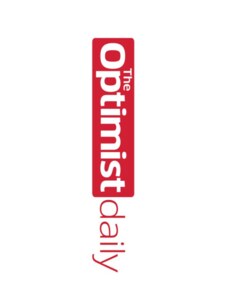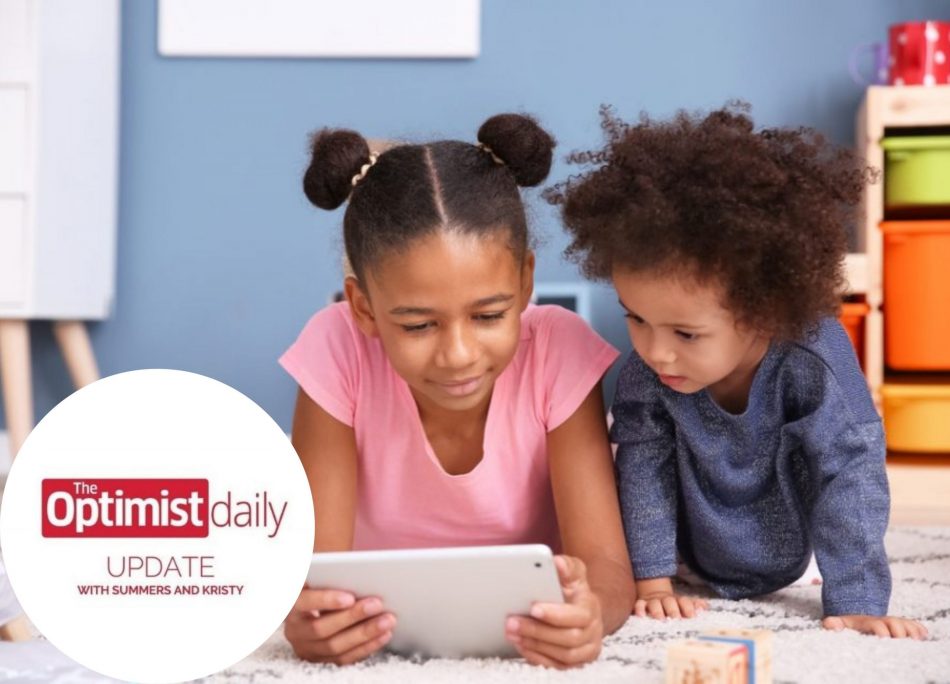This is an ASL interpretation and transcript of the December 10, 2021 episode of The Optimist Daily Update titled “Mariella Satow: Sign Up.”
Transcription:
Summers: Hello, universe. Welcome to the Optimist Daily Update. I’m Summers McKay.
Kristy: And I’m Kristy Jansen, and we are part of the team behind the Optimist Daily; making solutions the news. We bring your reader-funded solutions news every day in order to change the tenor of news media, social media, and the direction of your day, to help us all get focused on what’s going right in the world.
Summers: Seven days a week, we publish positive news stories written by award-winning journalists and delivered online, to your inbox, and through our social channels. And also, we are sharing these solutions and commute-worthy, walk-worthy, home office-worthy, wearing your Disney princess costume-worthy podcast. Today is Friday the 10th of December, 2021. Hello, Kristy, how are you today?
Kristy: I’m well, summer’s and you sound much better, even though you still have a little bit of a frog in your throat.
Summers: But yeah, I’m still a little bit husky, right? I’m a little husky, but I am feeling a ton better. It has been a very fascinating week being a parent of a toddler. I think last time you and I were together, we were talking about that. Parents everywhere are just struggling with childcare.

Kristy: It’s awful. And I just read an article in The New York Times yesterday about just how teachers are so burned out that they’re shutting down schools all over the country and making it go remote again. And the parents are freaking out because what do they do with their kids, you know, even if they’re an eighth grader, if you have to go to your job, you can’t leave them home alone. I’ve seen that movie.
Summers: Was Kevin, what’s his face? 14? I don’t know. Yeah.
Kristy: Macaulay Culkin. No, he was. I think in the show he was like an eight year old or a 10 year old or something.
Summers: But still, no, I mean, his movie name was Kevin McCallister. It’s totally Home Alone time of year, isn’t it? Well, my daughter’s class. So seven out of 15 kids actually have tested positive for COVID and we dodged a bullet, I guess, is the best way to put it, because we had a well-timed planned Disney vacation because she is negative and our family continues to test negative. So we got very lucky because of what has been a lifelong obsession with princesses for yours truly.
Summers: And that is what brings us to the guest we have today on the Optimist Daily Update. We are doing a feature this weekend on the Optimist View called “Kids on the Nice List,” all about kind of a year-end wrap up of the amazing teenagers that Kristy and I gush on and on about on the Optimist Daily that inspire us; That have done amazing and empowering things.
feature this weekend on the Optimist View called “Kids on the Nice List,” all about kind of a year-end wrap up of the amazing teenagers that Kristy and I gush on and on about on the Optimist Daily that inspire us; That have done amazing and empowering things.
Summers But today we are introducing to the Optimist Daily Update listenership Mariella Satow, who is the creator of Sign Up. At the age of 17, she is bringing ASL to Disney movies. So for those who are hearing impaired, you can read captions. But if you think about it, little kids can’t read yet and they are learning language. And Mariella looked at the opportunity to create a free Chrome extension, an app that parents can add on to actually translate these movies into ASL.
Summers: I get chills thinking about it because this online sign language extension makes sign language interpretation available for a variety of animated movies. She started with Disney. It’s not just staying there, but she’s

17. She’s a senior in high school. She adopted a dog yesterday named Daisy, and she is amazing and she has created this app.
Kristy: And she’s making time for us!
Kristy: I think she definitely deserves to be on the nice list this year for sure. Mariella, welcome to the Optimus Daily Update.
Mariella: Thank you.
Summers: Now you’ve kind of had a pretty busy month, right? The coverage about sign up has gone wide and far right. I see you everywhere right now. I hit Google and your name just goes crazy. What is that like?
Mariella: It’s so surreal. I mean, Sign Up kind of went viral overnight, which was the most shocking thing. You know, 20,000 hits on the website overnight. I just couldn’t believe it. I think my family is in shock.
Summers: So tell us a little bit about the process. And, you know, because everyone says, all right, so viral success. We all know that viral successes actually mean preparation, education, opportunity, arrival. Tell us the timeline before the 20,000 hits on the site?
Mariella: Yes, so I have probably been working on Sign Up for a year now. I started learning sign language at the beginning of COVID; March 2020, and soon after I found out that there were no ASL captions. I looked at them because that’s how I normally learn languages, right?
Summers: Subtitles absolutely. I actually have mine on when Brennan, my daughter, watches shows. And when I was growing up, that’s how we would learn as we watched the movie in Spanish with the English captions. Or the movie in English with the Spanish captions. So that’s so interesting that that well-known practice of reading captions to learn a language you found that missing piece.
Kristy: And Mariella, what got you interested in learning sign language? Why did you choose that as your COVID project?
Mariella: I mean, I don’t have a direct connection to it. I don’t know anyone who speaks sign language, but I guess I always just wanted to learn and COVID, you know, it’s the perfect time to take up things you don’t normally have time for. I’ve always been interested in languages, you know, Latin, Greek, Spanish, but I didn’t know there was something different about sign language with the way it combines words and physicality. And I don’t know just the facial expressions. It’s a very alive language.
Kristy: You know, we just recently wrote an article about how when you’re learning a language, if you also have gestures, you learn it better. That was the article we featured a few weeks ago. So it’s what you’re saying. I mean, language is not just the words that you’re speaking, it’s also your gestures and your expressions. And I think that’s all incorporated in sign language specifically.
Mariella: Yes, exactly.
Summers: So you realize that there weren’t captions in sign language. What happened next?
Mariella: So I started the project thinking that it would be for other American Sign Language students like me, but that soon changed. I quickly found out that within the deaf community this was a problem as well. So it kind of changed from a learning tool to a media accessibility one, and I made sure I worked with the deaf community and ASL professionals to make sure sign up was accurate and needed, and that was mostly through Facebook polls.
Summers: Really? So a 17-year-old, believe it or not, went on Facebook because what? 17 year olds on Facebook? But we do. We actually use Facebook a lot for the Optimist Daily because we find it to be a place that people are looking for resources. And so you were using Facebook polls as a tool to generate interest in and really learn whether or not this would be a valuable tool for the community. And then you went and used your dog walking money to build an app for a real kid. Are you kidding? Are you for real? Tell us about that.
Mariella: During the summer, I walked up to seven dogs a day, which I loved and the added bonus of raising money for Sign Up. I mean, the budget was tight. Dog walking isn’t the best paid job. Yeah, I found a tech developer very easily who believed in the mission. And he and his team started straight away, and then it was just a matter of finding interpreters. And I’ve had to kind of two from the very beginning who did believe in the project. So most of the movies right now are by those two amazing women, McKayla and Jessica. And we’re expanding now. I mean, I have, I think, two dozen volunteers now, which is amazing to sign movies now.
Summers: So tell us, at the volunteer interpreting team, they will record themselves signing the movies and then you overlay it through the app? Is that how it basically works?
Mariella: Yes. Yeah, and it’s a pop up box on top of Disney Plus, and you can move it, enlarge it. It’s kind of interactive.
Summers: Hmm. Tell us a little more about the movies that you chose. And why did you start with Disney movies? Obviously, like, that’s media friendly, but what movies did you start with and how did you kind of kick it off?
Mariella: So no one really knew about the project at the very beginning, so I just chose my favorite movies, to be honest. My absolute favorite is The Incredibles, so I had to start with it.
Kristy: And that’s a great one for it, just because it’s about kids who have different abilities, right?
Mariella: Yes, exactly. Superpowers.
Kristy: And deafness can be seen as a superpower. It often is by people in the deaf community.
Mariella: Yes, like the new Eternals movie. Yes, exactly. And then after that, when people started getting interested, we set up a request form and that has been very active. We have thousands of requests. And since then, we’ve just picked the most requested every week and have interpreted those.
Kristy: Which ones are you able to track? Like which ones are most watched?
Mariella: I am not, unfortunately. No, just most requested.
Summers: All right. Because I know that Frozen is probably a big one. And even Kristy, who is not a Disneyfile, dressed up as a character from Frozen.
Kristy: I did. I did.
Kristy: So Disney era Kristy was Anna from Frozen. Mariella, can you talk a little bit about what you think Disney movies do for young children, and especially young children in the deaf community, if they can have access to these magical stories?
Mariella: You know, I think watching Disney movies is just a rite of passage for any kid. I mean, me and my sister spent every weekend just watching every type of Disney movie. And I think the fact that some kids in the deaf community can’t have that and can’t join in on that experience, it’s quite heartbreaking. But you know, my favorite piece of feedback is when I’ve interpreted someone’s favorite movie and they watch it every day.
Kristy: Now, every parent knows that kid watches movies repeatedly over again.
Summers: Yeah, I haven’t been on the request form, but I have seen Cars 3, probably 742 times in the last week. So if you could get on the Cars movie, I would be teaching my daughter ASL simultaneously.
Summers: Now, parents are largely accessing this extension through a Chrome browser, which logically, either it’s a Chrome browser or an app. How are they broadcasting it to their TV? For those parents who might want to give their kids access to this and teach them ASL even if they are not hearing impaired, are you using Chromecast? What should they do to give their kids access to this?
Mariella: The thing that has worked most is just screen mirroring. I mean, obviously I’d love to embed Sign Up within the TV applications. I’m not sure how that would work, but yeah, mirroring is how most people use it.
Summers: Okay, so you loaded up on your kids tablet. You mirror it to the, you know, whatever big screen you’re watching on, what else is next for you?
Mariella: Well, I hope to just keep on expanding Sign Up. We’re about to launch a Netflix version. A lot of the requests have been more grown-up films, which I wasn’t expecting, but we’re trying to broaden our audience. And we’ve recently partnered with PBS Kids, so PBS will have Sign Up embedded with some of their TV shows, some of their learning resources.
Summers: Wait, are you guys going to do Daniel Tiger on PBS?
Mariella: I haven’t heard of that.
Summers: Oh my gosh. So we watch the PBS app at this house. Now I will freely admit that COVID parenting, having a toddler, being a full-time mom, I way overuse screen time. And I am in a constant state of trying to find out how to not feel guilty about my screen time. Sign up, if it was on the PBS app, would make me feel double not guilty about Brennan’s ubiquitous screen time.
Kristy: So I have two questions for you, Mariella. One. Have you gotten any feedback from Disney Plus on this app? Have they reached out to you or have you had any direct contact with Disney, the company itself?
Mariella: They have not reached out. Some pretty big newspapers have asked for quotes from them, but no one has heard anything back regarding Sign Up.
Kristy: And then do you have any stories or specific stories of children you’ve heard from in the deaf community about their reaction to having this resource and what impact that you’re seeing in terms of making these kinds of films accessible?
Mariella: I think in general, the statistic that stuck with me was 90 percent of deaf children have hearing parents, a lot of which do not learn American Sign Language. So the fact that they can use Sign Up and the whole family can have a movie night. I love hearing those types of stories.
Kristy: Oh, that actually warms my heart to hear that. Yeah, I’m surprised that hearing parents don’t learn sign language with their deaf children. That’s an interesting statistic. I don’t question it, but it’s interesting.
Summers: When one is raising a child, oftentimes they encourage us to learn this sort of sign language and to teach them basic signs for kids. So my daughter doesn’t know how to say “please” without making the sign for please on her chest. And she thinks that “thank you” also involves tapping her chin, right? She’s just kind of got those ingrained. Those physical words are ingrained.
Summers: Do you think that there is, you know, increasing exposure to ASL to children at a younger age, obviously is going to have cognitive advantages like multilingual children have cognitive advantages versus just, you know, single language families.
Summers: I would hazard to guess that this is a tool that parents of even hearing children can use to increase their cognitive engagement with their littles, as well as early form communication. Have you done any studies into that? I mean, I know studies are crazy, right? You’re just at the beginning. But have you had any conversations with experts about that?
Mariella: I have spoken to teachers at deaf schools who definitely think that being multilingual has, you know, long lasting effects even very later on in life with dementia and Alzheimer’s, but especially sign, you know, it just uses a different part of your brain than English or French. You know, I think every child should learn sign language, and I think it is becoming a lot more popular. I mean, all the progressive preschools in Manhattan have sign language.
Kristy: Oh, that’s that’s interesting. I didn’t realize that that’s actually part of the curriculum.
Summers: Yeah, the sign is part of the curriculum at Brennan’s school as well. Yeah.
Kristy: And there’s more than one sign language, right? American Sign Language is its own particular language. Do you know what the differences are with other sign languages?
Mariella: Yes, there are 300 sign languages. And you know, it is very hard to understand some of the other ones. There’s very weird similarities between American Sign Language and Russian Sign Language. But, you know, I can’t understand British Sign Language when I go home. It just depends, I guess.
Kristy: So it’s colloquial in its own way. There’s different pockets of communication.
Mariella: Yes, they will sound different.
Summers: So ASL is obviously the first, you know, push for Sign Up. Do you have intentions on going into all of the other languages? What does growth look like and how can people help you grow?
Mariella: Yes. So I definitely want to launch in other countries. Canada does use ASL, so we’ll be launching there quite quickly. That’s an easy launch. A lot of places in Mexico use ASL, so we’ll also launch there. But other sign languages, I’d say British Sign Language is a priority. And Indo-Pakistani Sign Language also. There is a large proportion of deaf Indian children. And I actually have a couple of ambassadors already starting the project in India, which is great.
Summers: Wow. Mariella, you’re such an impressive person. I mean, you’re still in high school. Do you feel like you’ve fallen into a career for yourself in launching this project, which was basically passing time?
Mariella: Yes. I mean, I always thought I would major in English literature, but now I am seriously thinking about accessibility and tech and deaf studies in college. Definitely.
Kristy: So you are going to college, you’re not going to just be the Sign Up CEO?
Mariella: No, I will keep running Sign Up. But yes, I definitely want to go to college.
Summers: It’s funny because I have a child who’s at the tail end of her high school career as well, and we talk about projects and things that, you know, can sort of move the needle on making a difference in this world, but also can sort of play into the college application process. And while this probably wasn’t your intention, Mariella, you have one heck of an application ready for you. I think you will have your pick of the litter when it comes to what school you want to go to. Can we put anything into the ethos as far as hopes and dreams for you for college? What should we be rooting for?
Mariella: I applied REA to Stanford, which is coming out in a couple of days. But I mean, I love everything on my list. I’ve applied to 15 schools and any of them I’d be lucky to go to.
Summers: All right. Well, all you Stanford alums who are listening, even though I’m a Cal Bear, this is your chance. You’ve got to get her in.
Kristy: I’m interested in your interest in accessibility in general. Accessibility in tech. Can you tell me a little bit about what you find interesting about that field? Because it’s something that I really don’t know much about.
Mariella: Yes, I guess the most interesting part for me is sign language recognition technology. I think it’s so cool that, you know, tech can interpret just a hand movement.
Kristy: So like Siri for sign language, in other words?
Mariella: Yes. And it can turn ASL into written text and vice versa.
Summers: My family and I were at a sandwich shop not too long ago and there was a hearing impaired person who was trying to order a sandwich and they were texting their order. So basically typing in the order and showing it. And then actually there was a staff member, I guess, and I didn’t see this happen. My older daughter actually shared this story with us, but a staff member knew sign language and came around back and helped sign so that the person could order their sandwich.
Summers: But if you think about something that could translate sign into text or translate sign into verbal language, allowing communication technology like that would just be, you know, just continues to be really, really compelling and extraordinary.
Mariella: So amazing.
Kristy: So so Google Translate for sign language?
Summers: Exactly, exactly. Mariella, do you have a GoFundMe for your company?
Mariella: I do. That has been running for about a month now.
Summers: And would you like to share anything about it with our team? We will make sure it’s in the notes, but what is your goal and what are you going to use the money for?
Mariella: Yes. So currently we have a goal of $10,000. We are $7,000 of the way there, which is incredible, and that will be covering mostly interpretive costs, both hearing and deaf, and tactical advertising, tech development for new platforms like Netflix. And then just expansion in general, hiring BSL interpreters and IPSO interpreters.
Summers: Excellent. And then we always wrap up our interviews by asking our guests what makes them feel optimistic about the world today. So it could be a story on The Optimist Daily. You, of course, could talk about your own story on The Optimist Daily or just general things in the world. What makes you optimistic when you get up every morning and do the amazing work you do?
Mariella: I think just wider representation and accessibility in the world, like the first deaf Marvel superhero. I mean, that was a major moment for the deaf community and for the world. And I think just seeing accurate representation, especially within film and media; that makes me excited.
Summers: Oh, Kristy. She is definitely on the nice list. I am giving to the GoFundMe, no question. I think, Mariella, thank you for what you have done.
Kristy: Can you just say your URL, Mariella? Just so we have that spoken out. Signupcaptions.com. Is that right?
Mariella: Yes, we are at signupcaptions.com
Summers: Fantastic. Everybody head to signupcaptions.com. Go to the GoFundMe. Check out the nice list this weekend on the Optimist View if you are an Optimist Daily Emissary. And for now, for this week, for this different kind of week on the Optimist Daily. Thank you all for listening. We promise to continue to share positive solution-based stories with ideas on how you can participate in this changing world and ensure it is changed for the good. We promise to cover the current events with accuracy, legitimate sources, and offer you the information needed to chart new paths for all of us.
Kristy: And, if you have not already become an Emissary, but you have the means, please do consider becoming one on the Optimistdaily.com and you can help support reader-funded independent journalism ,starting for just $5 a month, and be part of the solution changing consciousness addressing our world’s biggest challenges with a problem solving mindset. And shine a light on people like Mariella, who are doing incredible things to make our world a better place for more of us. Please help us keep The Optimist Daily free for everyone who needs it, supported by those of us who can. Thanks everybody for listening today. We’ll be back on Monday with more solutions.
Summers: Bye, guys.











